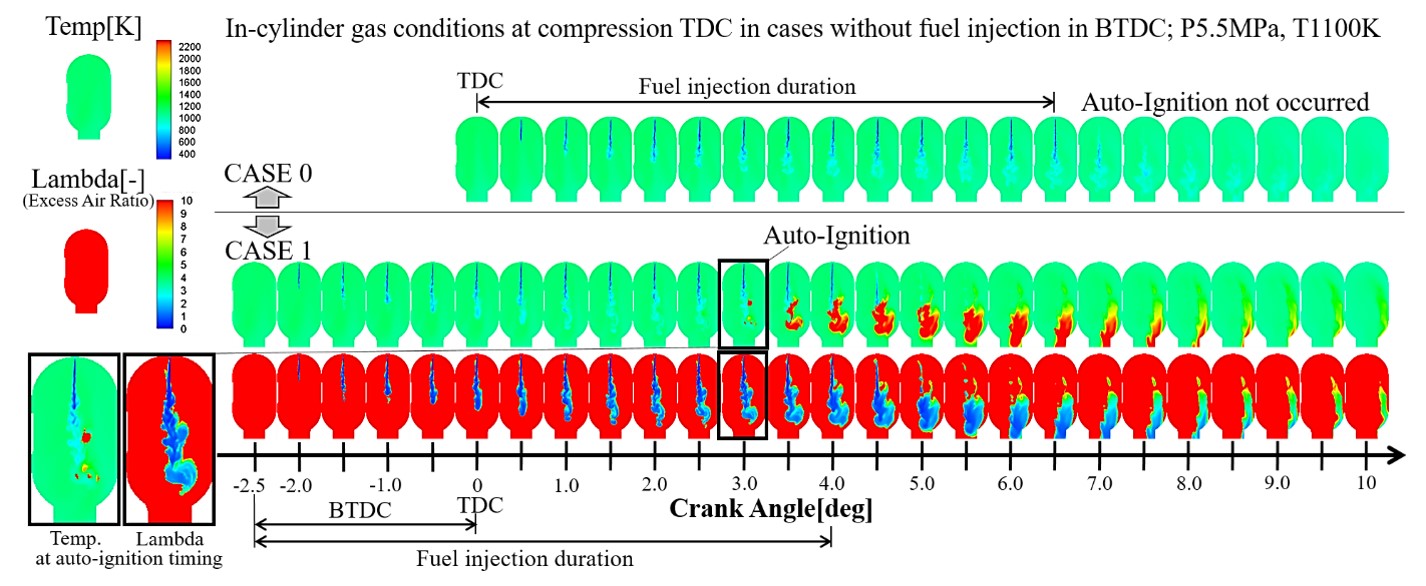Numerical Analysis on the Effect of Fuel Injection Timing on Auto-Ignition of an Ethanol Spray in a Rapid Compression and Expansion Machine
Main Article Content
Abstract
This study deals with the development of controlled-ignition technology for high performance CI (Compression Ignition) alcohol engines. In our previous numerical analysis, it is concluded that fuel injection timing is one of the most important factors for the control of auto-ignition of an ethanol spray. We numerically investigated the effect of fuel injection timing on auto-ignition quality of an ethanol spray in a rapid compression and expansion machine (RCEM) by using the commercial CFD code “CONVERGE”. Results showed that it was possible to control the auto-ignition timing of an ethanol spray in the RCEM by the adjustment of fuel injection timing. In addition, heat release patterns after auto-ignition of a fuel spray similar to the conventional DI (Direct Injection) diesel engines was numerically indicated even for ethanol direct injection by the precise control of fuel injection timing. Totally judged from the results described the above, this study showed the feasibility of diesel engine operation fueled by neat ethanol by the control of fuel injection timing.
Article Details

This work is licensed under a Creative Commons Attribution-NonCommercial-ShareAlike 4.0 International License.
This work is licensed under a Creative Commons Attribution-NonCommercial-ShareAlike 4.0 International License.
References
Zhang X, Li T, He R, Chen R. Study on the physicochemical properties and spray and combustion characteristics of 1‑Butanol/Diesel fuel blends in a constant-volume combustion chamber. Energy Fuels. 2019;33:10218-10227.
Li Z, Mi S, Zhang Y, Zhu J, Qian Y, Zhu L, et al. A comparative study on alcohol-diesel blended fuels in a common rail diesel engine: combined effects of carbon numbers, oxygen content, and molecular structure. Proc Inst Mech Eng A: J Power Energy. 2022;236(1):124-136.
Ravikiran Sastry G, Kumar Gugulothu S, Bharath Raju LB, Kumar Panda J, Sureshchandra Bhurat S, Burra B. Influence of exhaust gas recirculation on performance, combustion, and emission characteristics of a common rail direct injection diesel engine fueled by diesel/higher alcohol blends. J Thermal Sci Eng Appl. 2022;14(10):1-16.
Cova-Bonillo A, Patino-Camino R, Jose Hernandez J, Lapuerta M. Autoignition of ethanol-diesel blends: Is it worth dehydrating ethanol?. Fuel. 2022;317:123523.
Necati Ozsezen A. Influence of pilot fuel injection and boost air pressure on combustion characteristics in a diesel engine fueled with Ethanol-Butan-2-ol-Fossil diesel blends. Fuel. 2022;314:123081.
Zhan Z, Tian J, Li J, Lv J, Wang S, Zhong Y, et al. Investigation on combustion, performance and emission characteristics of a diesel engine fueled with diesel/alcohol/n-butanol blended fuels. Fuel. 2022;320:123975.
Patiño-Camino R, Cova-Bonillo A, Lapuerta M, Rodríguez-Fernández J, Segade L. Surface tension of diesel-alcohol blends: Selection among fundamental and empirical models. Fluid Phase Equilib. 2022;555:113363.
Atelge MR. Investigation of a ternary blend of diesel/ethanol/n-butanol with binary nano additives on combustion and emission: a modeling and optimization approach with artificial neural networks. Fuel Process Technol. 2022;229:107155.
Siebers DL, Edwards CF. Auto-ignition of methanol and ethanol sprays under diesel engine conditions. SAE Trans.1987;96:140-152.
Gutheil E. Numerical analysis of the autoignition of methanol, ethanol, n-heptane and n-octane spray with detailed chemistry. Combust Sci Technol. 1995;105(4-6):265-278.
Saitoh H, Uchida K. On the main factors governing auto-ignition phenomenon of alcohol spray –a study from the viewpoint of fuel properties–. SAE Int J Fuels Lubr. 2009;2(1):911-920.
Saitoh H, Uchida K, Watanabe N. Numerical study on the required surrounding gas conditions for stable auto-ignition of an ethanol spray. J Combust. 2019;2019:1329389.
Sanchez FZ, Braga CVM, Braga SL, Teixeira CV, Loaiza JCV. An experimental study of the compression ignition of ethanol/n-butanol blends in a rapid compression machine. SAE Tech Pap. 2021;2020(36):0013.
Saitoh H, Tsunoda H. Numerical analysis on the temperature of an ethanol spray in its mixture formation process under diesel engine operating conditions. Proceeding of the 13th Pacific Symposium on Flow Visualization and Image Processing; 2022 Aug 7-10; Tokyo, Japan.
Marinov MN. A detailed chemical kinetic model for high temperature ethanol oxidation. Int J Chem Kinet. 1999;31(3):183-220.



